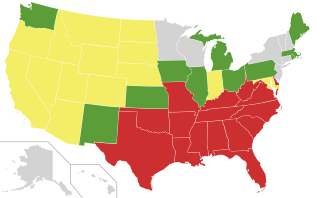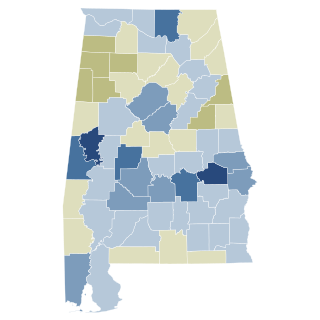Related Research Articles

Clay County is a county in the east central part of the U.S. state of Alabama. As of the 2020 census the population was 14,236. Its county seat is Ashland. Its name is in honor of Henry Clay, famous American statesman, member of the United States Senate from Kentucky and United States Secretary of State in the 19th century. It was the last dry county in Alabama with no wet cities within its boundaries, until a vote on March 1, 2016, approved the sale of alcohol in Lineville and Ashland.

Randolph County is a county on the central eastern border of the U.S. state of Alabama. As of the 2020 census, the population was 21,967. Its county seat is Wedowee. Its name is in honor of John Randolph, a member of the United States Senate from Virginia. Randolph County was a prohibition or dry county until 2012, when the citizens of Randolph County voted to repeal prohibition.

Wedowee is a town in Randolph County, Alabama, United States. At the 2010 census the population was 823, up from 818 in 2000. The small town is the county seat of Randolph County. It was initially incorporated in 1836, but its charter lapsed by the late 19th century. It was reincorporated in 1901.

Woodland is a town in Randolph County, Alabama, United States. At the 2010 census the population was 184, down from 192 in 2000. It incorporated in 1967.
Miscegenation is marriage or admixture between people who are members of different races. The word, now usually considered pejorative, is derived from a combination of the Latin terms miscere and genus. The word first appeared in Miscegenation: The Theory of the Blending of the Races, Applied to the American White Man and Negro, an anti-abolitionist pamphlet David Goodman Croly and others published anonymously in advance of the 1864 presidential election in the United States. The term came to be associated with laws that banned interracial marriage and sex, which were known as anti-miscegenation laws. These laws were overruled federally in 1967, and by the year 2000, all states had removed them from their laws, with Alabama being the last to do so on November 7, 2000. In the 21st century, newer scientific data shows that human populations are actually genetically quite similar. Studies show that races are more of an arbitrary social construct, and do not actually have a major genetic delineation.

A promenade dance or promenade, commonly called a prom in American English, is a dance party for high school students. It may be offered in semi-formal black tie or informal suit for boys, and evening gowns for girls. This event is typically held at or near the end of the school year. There may be individual junior and senior proms or they may be combined.

The Houston Independent School District (HISD) is the largest public school system in Texas, and the eighth-largest in the United States. Houston ISD serves as a community school district for most of the city of Houston and several nearby and insular municipalities in addition to some unincorporated areas. Like most districts in Texas, it is independent of the city of Houston and all other municipal and county jurisdictions. The district has its headquarters in the Hattie Mae White Educational Support Center in Houston.
Loving v. Virginia, 388 U.S. 1 (1967), was a landmark civil rights decision of the U.S. Supreme Court which ruled that laws banning interracial marriage violate the Equal Protection and Due Process Clauses of the Fourteenth Amendment to the U.S. Constitution. Beginning in 2013, the decision was cited as precedent in U.S. federal court decisions ruling that restrictions on same-sex marriage in the United States were unconstitutional, including in the Supreme Court decision Obergefell v. Hodges (2015).

Enterprise High School is a 7A public high school at 1801 Boll Weevil Circle in Enterprise, Coffee County, Alabama, USA, in the Enterprise City School District. The school houses grades 9-12.
Pace v. Alabama, 106 U.S. 583 (1883), was a case in which the United States Supreme Court affirmed that Alabama's anti-miscegenation statute was constitutional. This ruling was rejected by the Supreme Court in 1964 in McLaughlin v. Florida and in 1967 in Loving v. Virginia. Pace v. Alabama is one of the oldest court cases in America pertaining to interracial sex.

Johnny L. Ford is an American politician and mayor of Tuskegee, Alabama, and a former Alabama State Representative.

Prom Night in Mississippi is a 2009 Canadian-American documentary film written and directed by Paul Saltzman. The documentary follows a group of 2008 Charleston High School high school seniors in Charleston, Mississippi as they prepare for their senior prom, the first racially integrated prom in Charleston history.
A segregated prom refers to the practice of United States high schools, generally located in the Deep South, of holding racially segregated proms for white and black students. The practice spread after these schools were integrated, and persists in a few rural places to the present day. The separate proms have been the subject of frequent press coverage, and several films.

The 2010 Itawamba County School District prom controversy took place in Itawamba County, Mississippi, and began when lesbian student Constance McMillen was refused permission to take her girlfriend to the Itawamba County Agricultural High School prom. As a result of a lawsuit brought against the school, the school canceled the prom. Parents were encouraged to organize a private prom, but they canceled it. A second private prom was organized and represented to be the official prom. Meanwhile, parents organized a secret prom to which McMillen was not invited and which most of the student body attended. The school district settled the lawsuit by agreeing to a payment to McMillen and adoption of a sexual orientation non-discrimination policy.

In the United States, many U.S. states historically had anti-miscegenation laws which prohibited interracial marriage and, in some states, interracial sexual relations. Some of these laws predated the establishment of the United States, and some dated to the later 17th or early 18th century, a century or more after the complete racialization of slavery. Nine states never enacted anti-miscegenation laws, and 25 states had repealed their laws by 1967. In that year, the U.S. Supreme Court ruled in Loving v. Virginia that such laws are unconstitutional under the Fourteenth Amendment to the U.S. Constitution.
Randolph County School District the a school district on Randolph County, Alabama, headquartered in Wedowee.
Sumter County School District is a school district operating public schools in Sumter County, Alabama; its headquarters are in Livingston.

Randolph County High School (RCHS) is a public middle and high school in Wedowee, Alabama, United States. It was established in 1910 and is part of the Randolph County School System. Parts of the school have burned down twice, once in 1910 and again in 1994. The school courted controversy when its principal banned interracial couples at its school dances.

2000 Alabama Amendment 2, also known as the Alabama Interracial Marriage Amendment, was a proposed amendment to the Constitution of Alabama to remove Alabama's ban on interracial marriage. Interracial marriage had already been legalized nationwide 33 years prior in 1967, following Loving v. Virginia, making the vote symbolic. The amendment was approved with 59.5% voting yes, a 19 percentage point margin, though 25 of Alabama's 67 counties voted against it. Alabama was the last state to officially repeal its anti-miscegenation laws, following South Carolina in 1998.
References
- 1 2 3 4 5 6 "Heat of the Night". Archived from the original on 2016-03-03. Retrieved October 28, 2009.
- 1 2 "Alabama town fears new school superintendent's alleged bigotry". CNN. Retrieved October 28, 2009.
- ↑ "United States Court of Appeals, Fifth Circuit". 1974. p. 458.
- ↑ Lindsay, Drew (7 September 1994). "New Calm Marks Opening of Storm-Tossed Alabama School". Education Week.
- 1 2 3 Smothers, Ronald (January 11, 1995). "Once Principal, but Now Barred From All Schools". The New York Times. Retrieved October 28, 2009.
- 1 2 3 Harrison, Eric (August 12, 1994). "Dating Changes, Discord Rock a Tiny Alabama Town - South: A principal is removed. A school is burned. But at heart of the tension is growing issue of race-mixing". Los Angeles Times. Retrieved October 28, 2009.
- 1 2 "No Mistakes, No More Tears: The Revonda Bowen Story" . Retrieved October 28, 2009.[ permanent dead link ]
- ↑ "Richard Barrett". Archived from the original on October 20, 2009. Retrieved October 28, 2009.
- ↑ "Wedowee". Archived from the original on September 11, 2009. Retrieved October 28, 2009.
- ↑ "The American Melting Pot? Miscegenation Laws in the United States". Archived from the original on November 1, 2009. Retrieved October 28, 2009.
- ↑ Altork, Tim (2 November 2016). "RCHS names field after Watters". The Randolph Leader. Retrieved 2019-08-21.
- ↑ "Alabama High School Football History". www.ahsfhs.org. Retrieved 2019-08-21.